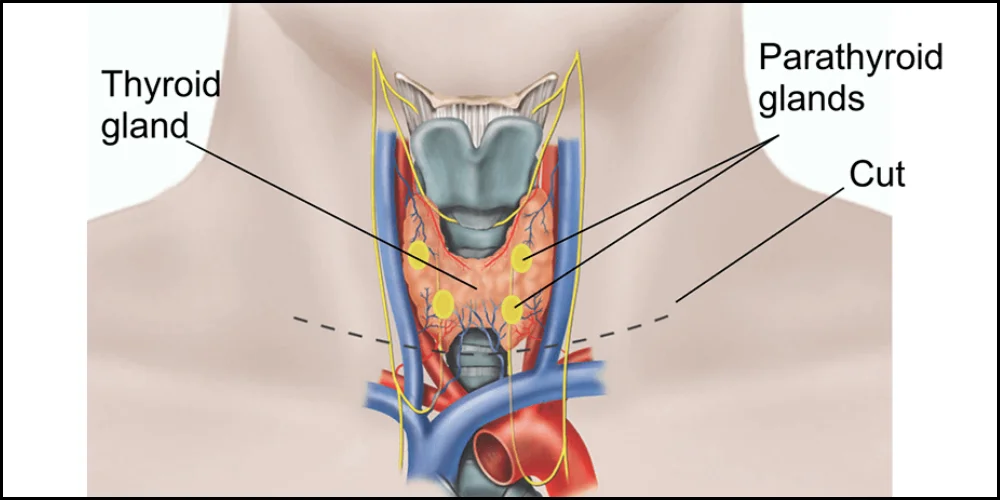Parathyroidectomy Surgery
Precise Removal of Parathyroid Glands for Better Health and Hormonal Balance
The procedure of parathyroidectomy consists of surgery to eliminate one or more of the parathyroid glands that are located close to the thyroid gland located in the neck. The procedure is used to treat hyperparathyroidism. condition in which parathyroid glands make too much parathyroid hormone, which results in an increase in calcium levels in blood. In Chirayu Super Speciality Hospital, we offer the most advanced parathyroidectomy procedure to treat this condition with ease and bring back normal levels of calcium as well as improve your overall wellbeing. Our skilled surgical team is committed to delivering the highest quality of care throughout your entire treatment process.

What is Parathyroidectomy Surgery?
The procedure of parathyroidectomy involves the elimination of one or two parathyroid glands in order to treat conditions like hyperparathyroidism. The parathyroid glands control calcium levels throughout the body, and when they become inactive and overactive, it could lead to different health problems, such as kidney stones, osteoporosis and cardiovascular problems. Parathyroidectomy seeks to regulate calcium levels through the removal of affected glands. The procedure can be carried out using traditional open surgery, or less invasive methods, dependent on the condition of the patient and the surgeon’s evaluation.
Who Performs Your Surgery?
Surgery for parathyroidectomy in Chirayu Super Speciality Hospital are performed by a group of highly experienced surgeons who specialize in the field of endocrine surgery. They have years of experience treating parathyroid gland problems and utilize the most recent techniques for surgery to ensure the best results. The surgical team collaborates with endocrinologists, anesthesiologists and nurses to provide complete medical treatment and support during the entire surgical procedure.
Types of Parathyroidectomy Surgery
- Minimally Invasive Parathyroidectomy : A tiny incision is cut within the neck as well as those involved gland(s) is removed with specially designed instruments. This method reduces scarring, lessens discomfort, and permits faster recovery.
- Traditional Open Parathyroidectomy : An incision of a larger size is made within the neck area to allow access and eliminate those glands that produce parathyroid hormones. This procedure is usually utilized for patients who have multiple glands affected, or for complex cases.
- Radio-Guided Parathyroidectomy : A specific procedure where tiny amounts of radioactive substance is used to pinpoint those overactive gland(s) which allows to remove the glands with precision and minimal disturbance to the surrounding tissues.
Symptoms Indicating the Need for Parathyroidectomy
- Increased calcium levels in blood.
- Insomnia, fatigue or muscles discomfort.
- Kidney stones, or frequently urine.
- Osteoporosis, or bone pain.
- Abdominal pain, nausea, or vomiting.
- Disorders of the brain, for example depression or memory issues.
Diagnosis for Parathyroidectomy Surgery
A diagnosis for hyperparathyroidism which could require a parathyroidectomy usually involves the use of testing for blood, imaging studies as well as a examination of the medical information. The blood tests can be used to determine the levels of parathyroid hormone and calcium Imaging studies like ultrasounds, CT scans, or Sestamibi scans aid in locating the parathyroid glands that are overactive. On the basis of your results, you physician will suggest the best treatment plan, based on the possibility of having surgery.
Treatment Process
The procedure for treating parathyroid glands begins with an extensive evaluation by your medical team. If surgery is determined to be necessary your surgeon will go over the procedure, its advantages and potential risks. The procedure is typically performed under general anesthesia and the procedure could last from a few hours to a couple of hours according to the complexity of the situation. Following surgery the patient will be supervised closely to ensure stability of calcium levels as well as a speedy recovery. After the surgery, follow-up appointments are scheduled to review your improvement and make any modifications to the treatment program.
Care and Recovery After Surgery
The recovery process following parathyroidectomy generally will require a brief stay in the hospital in the event that an approach that is minimally invasive is employed. The majority of patients feel relief from their symptoms shortly after the procedure. Post-operative care involves managing discomfort, assessing calcium levels and adhering to guidelines for activity given by the surgeon. You might be given calcium and vitamin D to ensure healthy levels of calcium during your recovery. It’s essential to keep every follow-up appointment to track your progress and address any issues promptly.
Advantages of Choosing Our Surgery Services
Expert Surgical Team
Our surgeons specialize in endocrine surgery, ensuring precise removal of the affected parathyroid glands with minimal impact on surrounding tissues.
Pre- and Post-Surgical Care
We provide detailed consultations, personalized treatment plans, and thorough follow-up care to ensure optimal outcomes and a smooth recovery.
Improved Quality of Life
By effectively treating hyperparathyroidism, our surgery helps restore normal calcium levels, alleviating symptoms and improving overall health.
What Our Patients Say
Read about our patients positive experiences and how Chirayu Super Speciality Hospital has positively impacted their health and well-being.


The surgical team at Chirayu is top-notch. My parathyroidectomy was handled with precision, and my recovery was smooth and quick.


The surgery was successful, and my symptoms improved immediately. The care I received at Chirayu was outstanding.


The surgeons at Chirayu were professional and compassionate. They took the time to explain everything and made me feel at ease.


I had a minimally invasive parathyroidectomy at Chirayu, and my recovery was quick and smooth. The team was exceptional.
Meet Our Medical Specialists
Our skilled surgeons specialize in parathyroidectomy, offering expert care and advanced techniques to effectively treat parathyroid gland disorders and restore health.
Frequently Asked Questions
Here, we provide answers to some of the most commonly asked questions to help you better understand about our surgery services. If you have any additional questions, please do not hesitate to contact us.
Preparation may include pre-operative blood tests, imaging studies, and discussions with your surgical team about the procedure and recovery process.
Parathyroidectomy is a surgical procedure to remove one or more parathyroid glands, typically to treat hyperparathyroidism.
Surgery is often recommended for hyperparathyroidism, which can cause elevated calcium levels in the blood and lead to various health issues.
Recovery typically involves a short hospital stay, pain management, and monitoring of calcium levels. Most patients experience a quick return to normal activities.
Types include minimally invasive parathyroidectomy, traditional open parathyroidectomy, and radio-guided parathyroidectomy, depending on the patient’s condition and surgical plan.



